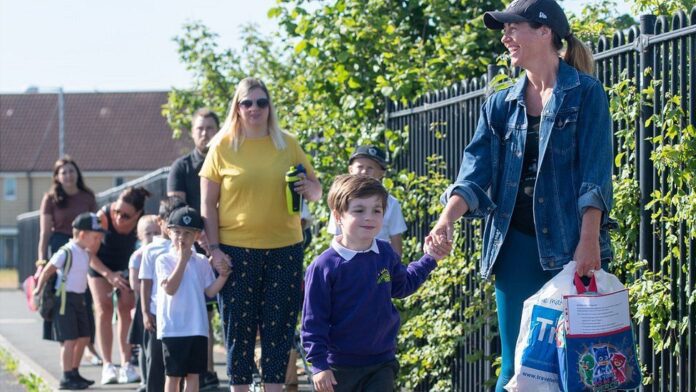
Ministers set to miss target for raising grades in English and maths
275,000 11-year-olds every year move to secondary schools with poor basic skills – up 50,000 on pre-Covid levels
Attainment gap between poor and well-off children widens further
Parents should be drafted in to reverse the slide
An ambitious Government plan to boost primary school grades in basic subjects has been derailed by the disruption caused by the pandemic, according to new research.
Ministers want 90 per cent of 11-year-olds to meet expected standards in reading, writing and maths by 2030 – up from 53 per cent seven years ago.
But after several years of slow improvement, levels of achievement have gone into reverse, slipping back to only slightly above grades recorded in 2015/16.
The slump means that some 275,000 11-year-olds a year are moving on to secondary education without command of basic subjects, 50,000 more than in 2019.
And according to new polling commissioned by the leading think-tank, the Centre for Social Justice, teachers are pessimistic about their chances of halting the slide.
Only 40 per cent of primary teachers believe that their pupils will hit the target in subjects critical to their chances of success at secondary level and in later life.
The CSJ proposes a radical plan to get standards rising again. Against the background of extensive research showing that the home environment plays a major role in classroom success, it calls on ministers to turn to parents to help secure better performance in basic subjects.
It calls for a ‘National Parental Participation Strategy’ to strengthen school – home links and encourage and assist parents to play their part in helping their children master foundational skills.
The report, Cracks in our Foundations, says:
“The progress made in improving overall attainment has been largely reversed. School shutdowns had an immediate and detrimental impact on primary educational outcomes. In the first full year after school shutdowns, 41 per cent of all year 6 pupils left school without reaching expected standards.”
Commissioned by the Centre for Social Justice (CSJ) as part of an examination into the state of education amongst primary school pupils, the report paints a devastating picture of the state of English primary school education in the post-Covid world.
The report highlights how the attainment gap in education – that between the poorest and most advantaged – is at its widest level for a decade.
It also points to recent research by the charity ICAN that skills in speaking (oracy) have also plummeted, with 1.5 million children across the UK at risk of being educationally left behind because of underdeveloped speech and language skills following the pandemic.
In a foreword to the report, social mobility expert Lee Elliot Major, Chief Executive of the Sutton Trust, says: “I believe new thinking is required to address the biggest scandal of our education system: the failure of hundreds of thousands of pupils to gain basic foundational skills at the end of primary school.
“That’s why I so wholeheartedly support the core recommendations set out in this report. All trusts and schools should be incentivised to develop effective parent participation and engagement plans.
“It’s time for us to take a bold step and embrace the power of parent participation in education.”
The CSJ commissioned a poll of 7,000 teachers with Teacher Tapp for the report. Its findings were stark, particularly amongst the most disadvantaged pupils.
For example, it found that just 32 per cent of teachers working in schools in the areas of highest deprivation were confident that most of their pupils would meet targets in numeracy and literacy skills this academic year, compared to 51 per cent in more affluent places.
Likewise, the poll revealed that nearly one in five teachers (19 per cent) reported that they were concerned that most of their children would not meet literacy and numeracy targets in 2022/23.
Again, teachers in schools in areas of higher deprivation were more concerned. 28 per cent of teachers in the most disadvantaged schools were concerned that most of their pupils would not meet targets, compared with 12 per cent of teachers in the most affluent schools who said the same.
Last year the majority (57 per cent) of children from disadvantaged backgrounds left primary school without reaching the expected standard in these subjects.
In the report, the CSJ argues that without radical change it is unlikely that pupils have any chance of reaching the Government’s 2030 target of 90 per cent of all pupils reaching expected standards. This would require a 30-percentage point jump in attainment levels from 2022.
The CSJ’s main recommendation is that the power of parents and the home learning environment should be utilised to narrow the attainment gap.
Evidence from the Education Endowment Foundation suggests that parental engagement can lead to four months of additional progress for an average student.
On average, parental engagement adds five months of progress per academic year in literacy skills and three months in numeracy. Other research has shown parental engagement has more of an impact on primary school children’s performance than any other variable.
Specific recommendations include:
- For the Department for Education (DfE) to outline a National Parental Participation Strategy which involves all schools. The strategy should create a new duty for multi-academy trusts (MATs) to focus on parental participation and publish parental participation plans. The DfE should also set out a structure for parental engagement that targets support towards those who need it most and make clear the responsibilities of other local agencies in achieving this vision.
- The DfE should review its catch-up initiatives to ensure that those who most need additional support receive it. The post-Covid National Tutoring Programme should be refocused towards children disproportionately affected by school shutdowns and the DfE should appoint 2,000 attendance mentors to reengage the 100,000 “ghost children” of the pandemic..
- The DfE should explore the feasibility of introducing an undergraduate level Degree Apprenticeship for primary school teachers. Schools would be able to use existing Apprenticeship Levy funding to invest in existing staff members.
Alice Wilcock, the CSJ’s Head of Education, said: “The Prime Minister has made clear his commitment to improving educational standards, stating that education is the closest thing to a silver bullet for making people’s lives better. If we want to improve life chances and set the country on a path to economic growth, this must start with getting the foundations right in primary school.
However, the idea that 90 per cent of children will leave primary school reaching expected standards in basic skills by 2030 is a far cry from reality. This aim is laudable but radical reform is needed to turn the tables on education inequality. Ensuring all children leave primary school with the basic skills they need for life is a matter of social justice.”

| [donate]
| Help keep news FREE for our readersSupporting your local community newspaper/online news outlet is crucial now more than ever. If you believe in independent journalism,then consider making a valuable contribution by making a one-time or monthly donation. We operate in rural areas where providing unbiased news can be challenging. |



















